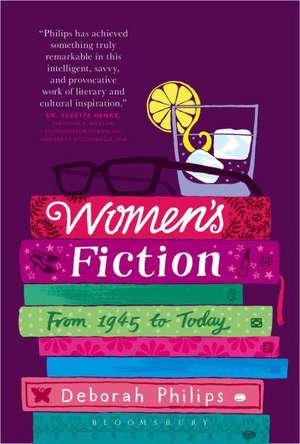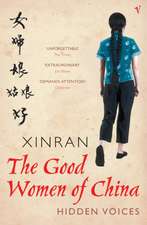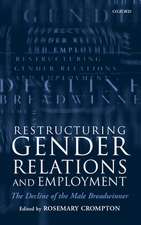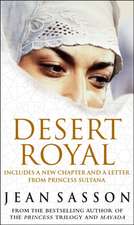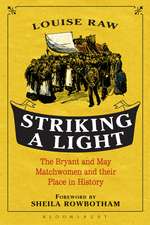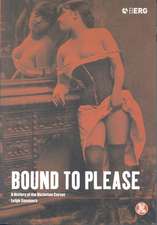Women's Fiction: From 1945 to Today
Autor Dr Deborah Philipsen Limba Engleză Paperback – 18 iun 2014
Preț: 191.38 lei
Preț vechi: 222.08 lei
-14% Nou
Puncte Express: 287
Preț estimativ în valută:
36.63€ • 38.10$ • 30.24£
36.63€ • 38.10$ • 30.24£
Carte tipărită la comandă
Livrare economică 14-28 aprilie
Preluare comenzi: 021 569.72.76
Specificații
ISBN-13: 9781441104267
ISBN-10: 1441104267
Pagini: 224
Dimensiuni: 156 x 234 x 13 mm
Greutate: 0.34 kg
Ediția:Revised
Editura: Bloomsbury Publishing
Colecția Bloomsbury Academic
Locul publicării:London, United Kingdom
ISBN-10: 1441104267
Pagini: 224
Dimensiuni: 156 x 234 x 13 mm
Greutate: 0.34 kg
Ediția:Revised
Editura: Bloomsbury Publishing
Colecția Bloomsbury Academic
Locul publicării:London, United Kingdom
Caracteristici
Includes new coverage of online afterlives of contemporary popular women's writing.
Notă biografică
Deborah Philips is Professor of Literature and Cultural History at the University of Brighton, UK. Her books include Fairground Attractions (2012), The Trojan Horse (2013) with Garry Whannel and Brave New Causes (1999) with Ian Haywood.
Cuprins
Acknowledgments1. Introduction2. What Did Women Want?: Post-War Masculinity in the Woman's Novel of the 1950s3. 'Mothers Without Partners': the Single Mother Narrative of the 1960s4. She's Leaving Home: the 'College Girl' Narrative of the 1970s5. Shopping as Work: the Sex and Shopping Novel of the 1980s6. Keeping the Home Fires Burning: the Aga Saga of the 1990s7. Shopping for Men: the Single Woman Narrative8. Resentful Daughters: the Post-Feminist Novel?9. Shopping for Meaning: The Spiritual Quest10. Having It All: Work and MotherhoodAfterwordBibliographyIndex
Recenzii
Her study will be welcomed by many women who have also read and enjoyed 'middlebrow' novels alongside 'highbrow' counterparts. It reveals the cultural currency of feminine popular fictions, and elucidates the pleasures they offer, without denying their occasionally serious limitations.
Deborah Phillips has produced a most welcome addition to the existing critical work on the "woman's novel", which is to say the novel written by women that constructs its readers as feminine...Women's Fiction 1945-2005 uses many of the approaches that we have come to associate with Cultural Studies and offers an enjoyable sense of time travel for those who are old enough to remember the decades in the second half of the twentieth century...
"Deborah Philips' study...is an invaluable text, deftly weaving literary history with cultural critique, social commentary, feminist analysis. Philips has achieved something truly remarkable in this intelligent, savvy, and provocative work of literary and cultural inspiration." - Dr. Suzette Henke, Thruston B. Morton, Sr. Professor of English, University of Louisville, USA
"Deborah Philips' study of what she terms women's "domestic romance" from 1945 to 2005 is both entertaining and perceptive, at once engaging and nicely judged. She looks at the shifting sub-genres through the decades, amongst others, single mother novels in the sixties, sex and shopping fiction in the eighties, aga sagas in the nineties, and chick-lit up to the present day. This is a welcome addition to feminist engagement in the field. Astute, full of sharp political insights and alert to recent cultural theory, it is a sparkling and persuasive account of the changing concerns and tropes of women's popular fiction." - Professor Helen Carr, Goldsmiths College, University of London, UK.
Women writers of "middlebrow" fiction have often been disregarded in terms of both the literary canon and feminists who otherwise support and promote the writings of women. The truths these popular writers wrote about were dismissed because the books were written in the "correct" way, the way that appealed to literary circles. Philips sought to change this perception with the first edition of this book, in which she discussed, decade by decade, the important and emerging themes of women's popular fiction alongside the themes of the literary works of the day . This updated edition carries the reader to 2014, covering the current popular novels that depict women "having it all" and the "spiritual quest" story. Philips's opinion of the popular novel takes a more negative turn with these mass market-produced books, obviously written to capitalize on one success in the field, and she raises new questions about how writing for women is marketed today. The book contains an expanded bibliography and interesting new content. Summing Up: Recommended. Lower- and upper-division undergraduates; graduate students; professionals; general readers.
Deborah Phillips has produced a most welcome addition to the existing critical work on the "woman's novel", which is to say the novel written by women that constructs its readers as feminine...Women's Fiction 1945-2005 uses many of the approaches that we have come to associate with Cultural Studies and offers an enjoyable sense of time travel for those who are old enough to remember the decades in the second half of the twentieth century...
"Deborah Philips' study...is an invaluable text, deftly weaving literary history with cultural critique, social commentary, feminist analysis. Philips has achieved something truly remarkable in this intelligent, savvy, and provocative work of literary and cultural inspiration." - Dr. Suzette Henke, Thruston B. Morton, Sr. Professor of English, University of Louisville, USA
"Deborah Philips' study of what she terms women's "domestic romance" from 1945 to 2005 is both entertaining and perceptive, at once engaging and nicely judged. She looks at the shifting sub-genres through the decades, amongst others, single mother novels in the sixties, sex and shopping fiction in the eighties, aga sagas in the nineties, and chick-lit up to the present day. This is a welcome addition to feminist engagement in the field. Astute, full of sharp political insights and alert to recent cultural theory, it is a sparkling and persuasive account of the changing concerns and tropes of women's popular fiction." - Professor Helen Carr, Goldsmiths College, University of London, UK.
Women writers of "middlebrow" fiction have often been disregarded in terms of both the literary canon and feminists who otherwise support and promote the writings of women. The truths these popular writers wrote about were dismissed because the books were written in the "correct" way, the way that appealed to literary circles. Philips sought to change this perception with the first edition of this book, in which she discussed, decade by decade, the important and emerging themes of women's popular fiction alongside the themes of the literary works of the day . This updated edition carries the reader to 2014, covering the current popular novels that depict women "having it all" and the "spiritual quest" story. Philips's opinion of the popular novel takes a more negative turn with these mass market-produced books, obviously written to capitalize on one success in the field, and she raises new questions about how writing for women is marketed today. The book contains an expanded bibliography and interesting new content. Summing Up: Recommended. Lower- and upper-division undergraduates; graduate students; professionals; general readers.
